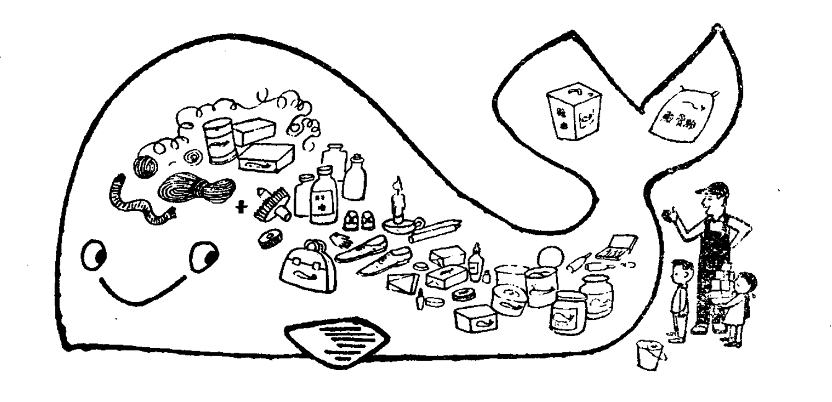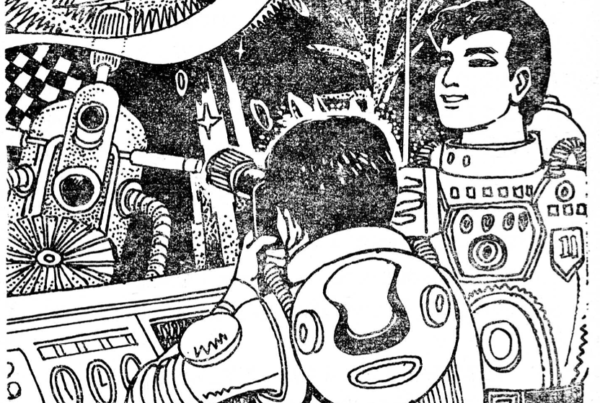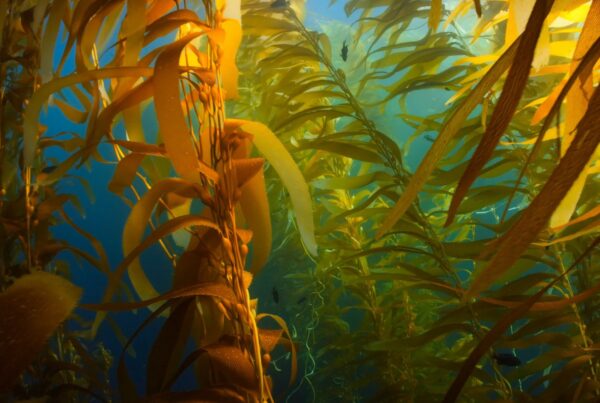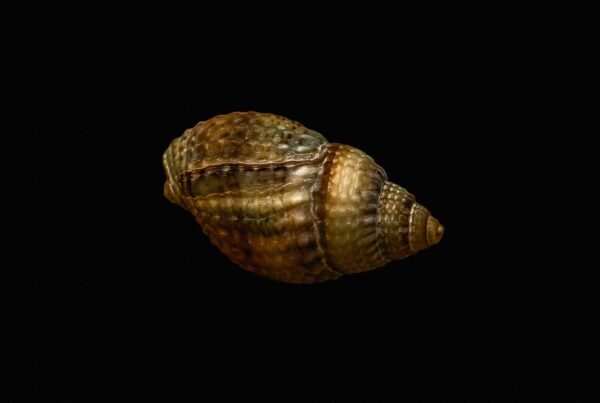[The pilot] "Little girl, don't you know? In ancient times, cows and sheep were all wild. Our ancestors caught wild cattle and sheep and tamed them, so they became domestic animals. The big whales in the oceans are also wild. But why not raise them as domestic whales as well?"
“What good would that do?” I asked, really not understanding.
“There are so many advantages!” Uncle Pilot slammed the thick nylon whaling line aside.
He sat down on the tail of the slippery sperm whale and said, “Huge whales are full of treasures… [Their] skin, oil, meat, guts and bones… None of them is useless. Once upon a time, capitalist countries killed many whales in the oceans every year. Biologists repeatedly appealed to everyone to protect the whales, at least not to slaughter them during their breeding season, otherwise they would become extinct. Nevertheless, capitalist countries do not care about this. They only care about making money and continue to hunt and kill indiscriminately all year round. There is a species of mermaid [dugong] that has been exterminated in this way.”

“Just think about it, how can our socialist country allow whales to become extinct? We manage the big whales and drive them to the ocean on time to graze, so they can breed more and grow well. Then, every year, we slaughter a certain number of whales according to our people’s needs. Isn’t this exactly the same as raising cattle and sheep?”
“That’s a good idea!” My little sister clapped her hands and spoke. “This way, the sea will become a big fishpond for whales.”
“That’s not true, young lady,” Uncle Pilot said. “The ocean is a pasture for whales, not a fishpond. Because an enormous whale is not a fish, it is more like a cow or a sheep.”
…
[When arriving at the large whale complex, I saw …] A large iron hook attached to the sperm whale’s jaws that hoisted it up, then left it lying belly-up on a basketball-sized platform. A large, shiny knife sliced into the sperm whale’s stomach and caused a gaping hole. From either side, a number of small iron hooks grasped the knife and yanked it to either side, revealing the white, moist oil underneath the inch-thick skin. In just one pull, a dozen small iron hooks attached to the sliced oil were detached, and the oil, several inches thick and several times the size of a ping-pong table, was sent to another conveyor belt. The smear of the whale’s internal organs could now be seen clearly, no different from a fat pig with its guts spilling open.

As I stepped out of the whale slaughterhouse, Uncle Pilot came across the street with my sister. She had a huge pile of stuff in both hands, including cans and paper bags. She called out to me excitedly, “Brother, brother, come and see! I have got so many presents!”
What on earth are the presents? A quick glance caught my attention. Oh! There were seven or eight different sorts of canned food, each with a different label, such as: “Braised whale tongue,” “Steamed whale meat,” “Whale liver sauce,” and “Whale heart in sauce”… There is also a bottle of “whale liver oil,” a bag of “whale meat puffs” and some cosmetic products including a bar of “ambergris soap” and a bottle of “ambergris balsam.”
…
“Smell this soap and balm. They are made from whale head oil and have ambergris added to them.”
The balm smelled pleasant, and the fragrance rushed straight to my head. But where did this “ambergris” come from?
“Uncle, isn’t ambergris dragon saliva?” I asked. “Biology books say that dinosaurs [the term for dinosaur in Chinese includes that for dragon] died out long ago in ancient times.”
“Ha-ha,” laughed Uncle Pilot. “You’re wrong about that statement. Ambergris is not dragon saliva, it’s a valuable spice taken from sperm whale intestines.”
Not realising there was anything so fragrant in the sperm whale’s intestines, I picked up the soap and took another whiff.
…
“Brother, now look at my neck and feet.”
How had I not noticed? My sister had a beautiful woollen scarf around her neck and a pair of hessian-like leather shoes on her feet. Needless to say, the shoes must have been made of whale skin. But what about the fur scarf? The whales were all smooth, and I had never seen one with fur before!
“You wouldn’t have guessed it,” said Uncle Pilot, as if he had guessed what I was thinking, “but this fur scarf is also made of whale skin. We take bits and pieces of whale skin and make them into faux wool — or whale hair to be precise — after which we weave them into lots of fine materials.”
…
“It never occurred to me that whales could be used for producing such a wide variety of things.”

“There are at least a thousand of them. Didn’t I tell you that the whales are full of treasure?”
“Just like big fat pigs.” My sister suddenly picked up on that.
“How can a fat pig be compared to a big whale?” I hurriedly squinted right at her. “How much does a fat pig weigh? At most, it’s only four or five hundred pounds! A big blue whale has … just to say that oil is …”
“Twenty thousand pounds. It would take at least two big trucks to transport it,” said Uncle Pilot.
“Then,” I asked again, “why should whales be driven out into the far oceans to graze? Wouldn’t it be much easier to keep whales inshore and manage them?”
“Children, feeding big whales is a big problem! A big whale needs several tons of food a day. Inshore feeding is not possible. Because of this, we only allow them to be driven back during the calving season to ensure the safety of both mother and baby. At other times, they are driven to far-off seas where there is plenty of food to keep them fed and fat. It’s a good thing that whales like to be in groups. As long as an electric submarine leads the way, we can guarantee none will be lost.”
“How can a big whale swim with a submarine?”
“Have you ever heard that there is always a leader in a flock of whales? Our submarine is an artificial head whale, which makes sounds like a head whale. Upon hearing it, the whales follow in a group.”

Translation of Chi, S-c. (1963). Dajing Muchang (大鲸牧场, Whale Ranch), first edition. Beijing: Zhongguo Shaonian Ertong Press, 1963.
Image sources: Chi, S-c. (1963). Dajing Muchang (大鲸牧场, Whale Ranch), first edition. Beijing: Zhongguo Shaonian Ertong Press, 1963.
Translation: Dongyang Li


